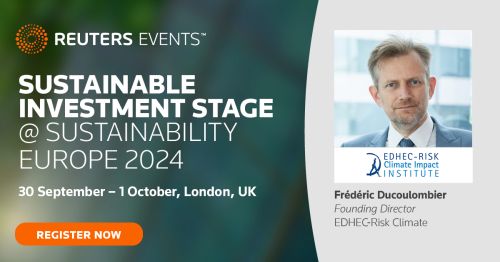
Frédéric Ducoulombier Explores SFDR Product Labeling, Transition Finance, and ESG Data Challenges at Reuters Sustainability Europe 2024
Written on 10 Oct 2024.

On September 30, 2024, Frédéric Ducoulombier, Director of EDHEC-Risk Climate Impact Institute, delivered critical insights during a session titled "What’s Next for the SFDR and Sustainable Fund Labels" at the Reuters Events: Sustainability Europe 2024 summit in London, an event attended by nearly 600 global business leaders and investors.
Speaking on the Sustainable Investment Stage, Frédéric joined Nathalie Dogniez, Chair of the Board of pan-European sustainable finance association Eurosif, in a panel discussion moderated by Dr. Raphael Tietmeyer of Climate and Company. The session focused on the EU Sustainable Finance framework, with particular emphasis on recent developments in the ongoing review of the Sustainable Finance Disclosure Regulation (SFDR) and addressed key issues around product naming and labeling and transition finance.
Panel Contributions:

 Asked to comment about data challenges facing fund managers seeking SFDR compliance, Frédéric explained that the wording of SFDR regarding both the definition of key concepts[2] and the specification of indicators to be disclosed created uncertainty about what data were required for compliance, which affected both product and data providers. He remarked that while the issue of the imprecision of fundamental concepts would probably be addressed by a future update of the Directive itself – which the consultations of the year past were supposed to inform – indicators had been specified by a delegated regulation and could be updated in the same manner. He explained that the proposal for a new delegated regulation which the European Supervisory Authorities (ESAs) finalized in December 2023 adjusts the definitions of the indicators for adverse impacts to reduce related data challenges and enhance the relevance of these disclosures.
Asked to comment about data challenges facing fund managers seeking SFDR compliance, Frédéric explained that the wording of SFDR regarding both the definition of key concepts[2] and the specification of indicators to be disclosed created uncertainty about what data were required for compliance, which affected both product and data providers. He remarked that while the issue of the imprecision of fundamental concepts would probably be addressed by a future update of the Directive itself – which the consultations of the year past were supposed to inform – indicators had been specified by a delegated regulation and could be updated in the same manner. He explained that the proposal for a new delegated regulation which the European Supervisory Authorities (ESAs) finalized in December 2023 adjusts the definitions of the indicators for adverse impacts to reduce related data challenges and enhance the relevance of these disclosures.
Mitigation of data challenges is done by addressing imprecisions in language and/or linking investor SFDR disclosures to disclosures by investee companies under the Corporate Sustainability Reporting Directive (CSRD). While this is most welcome, the draft delegated regulation also proposes to increase the number of Principal Adverse Indicators (PAIs)[3] whose disclosure is required of large financial market participants (FMPs)[4] despite the European Commission’s decision to reduce mandatory disclosures under CSRD in the context of the global backlash against sustainability regulation.[5] This points to another and better understood issue, i.e., the mismatch between investor-level and investee-level disclosures. For political expediency, sustainability disclosures were imposed upon FMPs before corresponding disclosure requirements were phased in for investee companies.
While FMPs have already produced two rounds of quantitative PAI disclosures (i.e., for calendar years 2022 and 2023), the first CSRD reports are not expected until 2025 (for calendar year 2024) and non-EU entities in the scope of the regulation will not be required to report until 2029 (in respect of 2028). It followed that FMPs had to rely on estimated data produced for data providers and that the latter often had little in the way of disclosures – let alone standardized disclosures – to train their estimation models. Coverage and data quality vary by PAI and region and material differences in estimates are found across providers.
In this context, the phase-in of CSRD promised substantial improvement in sustainability data availability and quality – in respect of reported data obviously, but also for estimated data. Unfortunately, the European Commission’s decision to require fewer datapoints from corporates than needed by FMPs for compliance with the extant regulation added a scope mismatch to the timeline mismatch.[6] The cart was put before the horse, and we are sorry, but it will have to be a donkey after all. Phasing in of sustainability disclosure requirements in other jurisdictions will improve data availability, but primarily in respect of climate issues which corporates perceive as material to investors (as such requirements will typically arise from requirements modelled upon the standards of the International Sustainability Standards Board, which do not extend beyond climate issues now). Data quality for PAIs remains inconsistent, and while mandatory corporate-level disclosures will improve it, notably in respect of climate issues, significant gaps are likely to persist throughout this decade, particularly for social indicators and metrics pertaining to sovereign bonds and real estate rather than investee companies.

The panel then turned to addressing transition finance in the context of SFDR. Frédéric explained that there is no definition of transition finance in the EU’s legal framework and that the SFDR does not give explicit recognition to related investments—which we may broadly describe as those that aim to fund the shift towards a sustainable economy. Furthermore, Article 9 funds, which are required to focus on sustainable investments, face restrictions in incorporating transition investments if the activities of investee companies produce significant environmental harm. As a result, they have a limited ability to focus on brown-to-green strategies targeted at sectors and issuers that could make material contributions to reducing emissions (and this true even in respect of the subset of assets in transition that can be aligned with the EU Taxonomy). Naturally, Article 8 funds, which are not required to target sustainable investments as defined in SFDR, can identify transition as one of the sustainability characteristics that they promote. The issue here is not one of excessive restrictions, but rather the excessive leeway given to product providers in defining transition, selecting investment strategies, and making disclosures. This undermines the dual purpose of SFDR: first, to provide decision-relevant disclosures for investors, and second, to channel funds towards activities that contribute to sustainability objectives. While this mirrors a broader flaw in SFDR 1.0, the absence of a legal definition for transition investment exacerbates the problem.

In this regard, Nathalie Dogniez underlined that the European Commission’s Recommendation on facilitating finance for the transition to a sustainable economy was a major step forward. The July 2023 recommendation highlights the importance of addressing transition finance through sector-specific, proportionate, and inclusive approaches. It provides definitions for transition, transition finance, and transition plan qualification criteria, and proposes linkages to the existing sustainable finance framework and its future evolution. Frédéric agreed that the communication demonstrated an understanding of the issue but raised concerns about the wide variety of investments classified as bona fide transition finance—ranging from targeted investments in taxonomy-aligned activities to portfolios tracking EU Climate Benchmarks, which have been criticized as, at best, inadequate to channel funds towards the transition and, at worst, institutionalized greenwashing that could hinder genuine progress. In this regard, he voiced appreciation for the recent ESMA Opinion on sustainable investments for recognising the need for high standards of integrity and uniform disclosures to combat greenwashing, produce investor-relevant information, and support the channeling of funds towards real-world transition investments.
The panelists agreed that this Opinion and other recent proposals from supervisors and advisors included very relevant proposals to better accommodate transition finance in the region’s sustainable finance framework, including through expansion of the EU Taxonomy and the introduction of SFDR product categories including “transition” funds along sustainable fund backed by prescriptive and science-based criteria. They agreed that the desire to retire the subjective definitions of sustainability at the heart of SFDR and instead anchor the qualification of investments in the Taxonomy was well founded but would require expanding the green Taxonomy into a traffic-light framework incorporating environmental and social dimensions, which could take years, involve technical challenges to ensure consistent application, and could face significant resistance in the current fraught political environment.
Following the panel discussion, each panelist led a dedicated one-hour workshop with practitioners to dive deeper into thematic issues. Frédéric explored transition finance within the context of the Sustainable Finance Framework and the extent to which the qualification of investments could be informed by net-zero investment frameworks developed by institutional investors. Nathalie focused on product categories and labels. Finally, Raphael provided an in-depth analysis of the interplay between SFDR and the EU Taxonomy.
Key Takeaways:
- Subjectivity of SFDR:
The subjective nature of ESG integration under SFDR is inclusive, but it limits the comparability of disclosures across products and providers, which dilutes the framework’s ability to effectively channel funds toward activities that are truly sustainable or essential for the transition.
- Data Challenges:
The panel underlined the ongoing challenges surrounding ESG data, particularly in aligning investor-level disclosures with those of investee companies, given the timelines and scope mismatches between SFDR and CSRD requirements. While the quality of data improves, product managers must ensure they use data in a manner that is fit for purpose and does not expose them to liability risks.
- Transition Finance Gaps:
SFDR is ill-suited for supporting transition finance—the exclusion of activities that cause significant harm is a major restriction for Article 9 funds, while the plasticity of Article 8 cannot guarantee the required ambition and integrity in strategies promoted as transition finance, especially in the absence of a legal definition for transition finance. While guidance exists to promote transition finance within the current framework, changes are needed to align it with SFDR’s goal of producing investor-relevant disclosures and funding transition efforts.
- Progressive Developments:
The European Commission's Recommendation and the ESAs' Opinions were recognized as important steps forward. These developments signal the shift toward prescriptive, science-based criteria for transition finance and sustainable investment products, even though full alignment with the EU Taxonomy will take time.
Future Directions:
The discussions stressed the need for a traffic-light taxonomy that includes both environmental and social dimensions. While this approach could solidify SFDR’s objectives, the panelists acknowledged that it faces political and technical hurdles, which may take years to resolve.
Related work by EDHEC-Risk Climate Impact Institute
EDHEC-Risk Climate feedback on draft European Sustainability Reporting Standards (ESRS), Ducoulombier, F., July 2023 (available at: https://ec.europa.eu/info/law/better-regulation/have-your-say/initiative...).
EDHEC-Risk Climate comments on final European Sustainability Reporting Standards (ESRS), Press Release, 3 August 2023
EDHEC-Risk Climate Impact Institute’s Response to the European Supervisory Authorities’ Call for Evidence on Greenwashing, Ducoulombier, F., Policy Contribution, EDHEC-Risk Climate Impact Institute, 2023 (October).
Sustainability Reporting and Material Delusions, Ducoulombier, F., Interview, EDHEC-Risk Climate Impact Institute, 2023 (October 2023)
Scope for Divergence - The status of value chain emissions accounting, reporting and estimation, and implications for investors and standard setters, Ducoulombier, F., Policy Report, EDHEC-Risk Climate Impact Institute, 2024 (March).
Footnotes
[1] Products that promote environmental or social characteristics are classified as Article 8 funds, and those with sustainable investment as their objective are classified as Article 9 funds. However, the SFDR does not specify a minimum proportion of assets in a fund that must promote environmental or social characteristics or qualify as sustainable investments.
[2] For illustration, contribution to an environmental or social objective; consideration of principal adverse impacts; and respect of good governance practices, which are required at the level of issuers so that their securities may be considered sustainable investments are not precisely defined.
[3] The ESAs’ project introduces five new mandatory PAIs covering social issues and retires one such indicator from the eighteen, mostly environmental, indicators currently required.
[4] FMPs for the purposes of SFDR include investment companies and credit institutions that provide portfolio management services, alternative investment fund managers (AIFMs), managers of Undertakings for Collective Investment in Transferable Securities (UCITS), companies offering insurance-based investment products (IBIPs), institutions for occupational retirement provision (IORPs) and companies offering personal pension products, and managers of certain venture capital and social entrepreneurship funds.
[5] On the role of fossil fuel interests in seeding and fueling this backlash, refer to the appendix of our March 2024 Policy Contribution titled Scope for Divergence.
[6] The Delegated Act pertaining specifying the first set of ESRS under the CSRD allows reporting entities to disclose voluntarily in respect of certain issues (irrespective of their impact or financial materiality), to withhold disclosure for non-material issues (apart from core general disclosures), and to avail of further flexibility in respect of certain mandatory disclosures (it also introduces multiple phase-ins).


